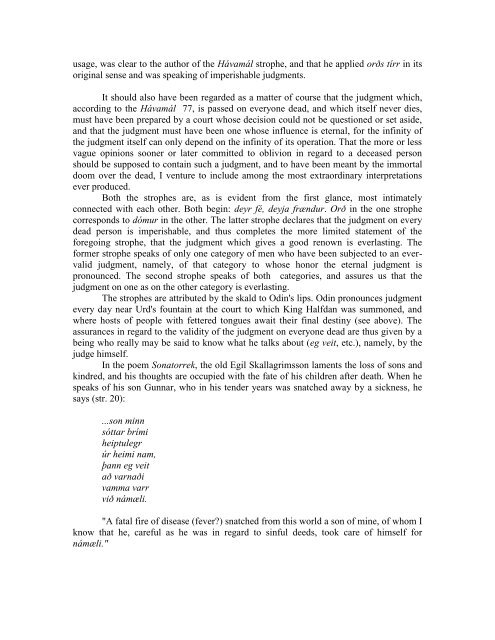Chapters 44-95 - Germanic Mythology
Chapters 44-95 - Germanic Mythology
Chapters 44-95 - Germanic Mythology
You also want an ePaper? Increase the reach of your titles
YUMPU automatically turns print PDFs into web optimized ePapers that Google loves.
usage, was clear to the author of the Hávamál strophe, and that he applied orðs tírr in its<br />
original sense and was speaking of imperishable judgments.<br />
It should also have been regarded as a matter of course that the judgment which,<br />
according to the Hávamál 77, is passed on everyone dead, and which itself never dies,<br />
must have been prepared by a court whose decision could not be questioned or set aside,<br />
and that the judgment must have been one whose influence is eternal, for the infinity of<br />
the judgment itself can only depend on the infinity of its operation. That the more or less<br />
vague opinions sooner or later committed to oblivion in regard to a deceased person<br />
should be supposed to contain such a judgment, and to have been meant by the immortal<br />
doom over the dead, I venture to include among the most extraordinary interpretations<br />
ever produced.<br />
Both the strophes are, as is evident from the first glance, most intimately<br />
connected with each other. Both begin: deyr fé, deyja frændur. Orð in the one strophe<br />
corresponds to dómur in the other. The latter strophe declares that the judgment on every<br />
dead person is imperishable, and thus completes the more limited statement of the<br />
foregoing strophe, that the judgment which gives a good renown is everlasting. The<br />
former strophe speaks of only one category of men who have been subjected to an evervalid<br />
judgment, namely, of that category to whose honor the eternal judgment is<br />
pronounced. The second strophe speaks of both categories, and assures us that the<br />
judgment on one as on the other category is everlasting.<br />
The strophes are attributed by the skald to Odin's lips. Odin pronounces judgment<br />
every day near Urd's fountain at the court to which King Halfdan was summoned, and<br />
where hosts of people with fettered tongues await their final destiny (see above). The<br />
assurances in regard to the validity of the judgment on everyone dead are thus given by a<br />
being who really may be said to know what he talks about (eg veit, etc.), namely, by the<br />
judge himself.<br />
In the poem Sonatorrek, the old Egil Skallagrimsson laments the loss of sons and<br />
kindred, and his thoughts are occupied with the fate of his children after death. When he<br />
speaks of his son Gunnar, who in his tender years was snatched away by a sickness, he<br />
says (str. 20):<br />
...son minn<br />
sóttar brími<br />
heiptulegr<br />
úr heimi nam,<br />
þann eg veit<br />
að varnaði<br />
vamma varr<br />
við námæli.<br />
"A fatal fire of disease (fever?) snatched from this world a son of mine, of whom I<br />
know that he, careful as he was in regard to sinful deeds, took care of himself for<br />
námæli."
















